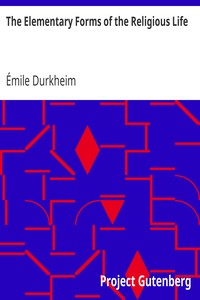The Elementary Forms of the Religious Life by Émile Durkheim
"The Elementary Forms of the Religious Life" by Émile Durkheim is a scientific publication written in the early 20th century. In this work, Durkheim explores the most primitive and simple forms of religion, aiming to analyze and explain the essential components of the religious experience and its fundamental role in society. He seeks to understand how religious beliefs and practices are rooted in collective social realities, which, in turn, reflect the nature
of humanity itself. At the start of the book, Durkheim outlines his methodology and the scope of his study, emphasizing the importance of examining primitive religions to uncover universal aspects of all religious practices. He argues against preconceived notions of religion, asserting that one must approach the subject with an open mind to fully appreciate the distinct characteristics of religious phenomena. Durkheim highlights the division between the sacred and the profane, establishing this duality as a foundational concept in understanding religious thought and behavior. He critiques existing definitions of religion that rely on supernatural elements or the concept of divinity, advocating for a broader perspective that includes a variety of beliefs and practices across different cultures. (This is an automatically generated summary.)
Read now or download (free!)
| Choose how to read this book | Url | Size | ||||
|---|---|---|---|---|---|---|
| Read online (web) | https://sendtokindle.compellingsciencefiction.com/ebooks/41360.html.images | 1.7 MB | ||||
| EPUB3 (E-readers incl. Send-to-Kindle) | https://sendtokindle.compellingsciencefiction.com/ebooks/41360.epub3.images | 609 kB |
Send
to kindle email: |
|||
| EPUB (older E-readers) | https://sendtokindle.compellingsciencefiction.com/ebooks/41360.epub.images | 634 kB | ||||
| EPUB (no images, older E-readers) | https://sendtokindle.compellingsciencefiction.com/ebooks/41360.epub.noimages | 628 kB | ||||
| Kindle | https://sendtokindle.compellingsciencefiction.com/ebooks/41360.kf8.images | 1.2 MB | ||||
| older Kindles | https://sendtokindle.compellingsciencefiction.com/ebooks/41360.kindle.images | 1.1 MB | ||||
| Plain Text UTF-8 | https://sendtokindle.compellingsciencefiction.com/ebooks/41360.txt.utf-8 | 1.3 MB | ||||
| Download HTML (zip) | https://www.gutenberg.org/cache/epub/41360/pg41360-h.zip | 572 kB | ||||
| There may be more files related to this item. | ||||||
Similar Books
About this eBook
| Author | Durkheim, Émile, 1858-1917 |
|---|---|
| Translator | Swain, Joseph Ward, 1891- |
| Uniform Title | Les formes élémentaires de la vie religieuse. English |
| Title | The Elementary Forms of the Religious Life |
| Note | Wikipedia page about this book: https: //en.wikipedia.org/wiki/The_Elementary_Forms_of_the_Religious_Life |
| Note | Reading ease score: 57.2 (10th to 12th grade). Somewhat difficult to read. |
| Credits |
Produced by Ruth Morrison, Tor Martin Kristiansen and the
Online Distributed Proofreading Team at http: //www.pgdp.net (This file was produced from images generously made available by The Internet Archive/American Libraries.) |
| Language | English |
| LoC Class | GN: Geography, Anthropology, Recreation: Anthropology |
| Subject | Religion |
| Subject | Rites and ceremonies |
| Subject | Religion -- Philosophy |
| Subject | Cults |
| Subject | Totemism |
| Category | Text |
| EBook-No. | 41360 |
| Release Date | Nov 13, 2012 |
| Copyright Status | Public domain in the USA. |
| Downloads | 4385 downloads in the last 30 days. |
| Project Gutenberg eBooks are always free! | |

